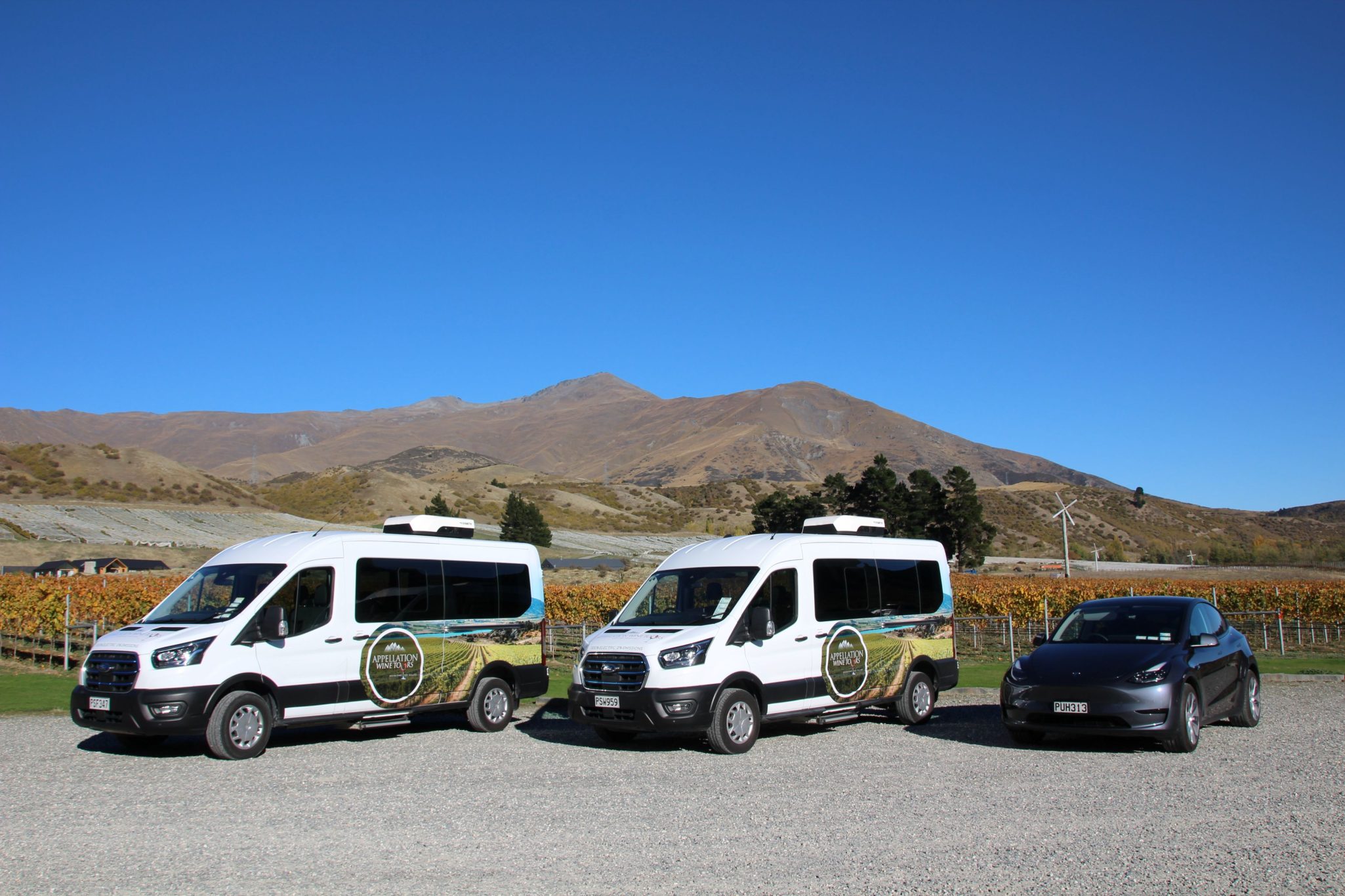NOTE: We are open & operating in RED. COVID-19 Vaccine Passports required. Find out more here.
Written by Craig Tansley
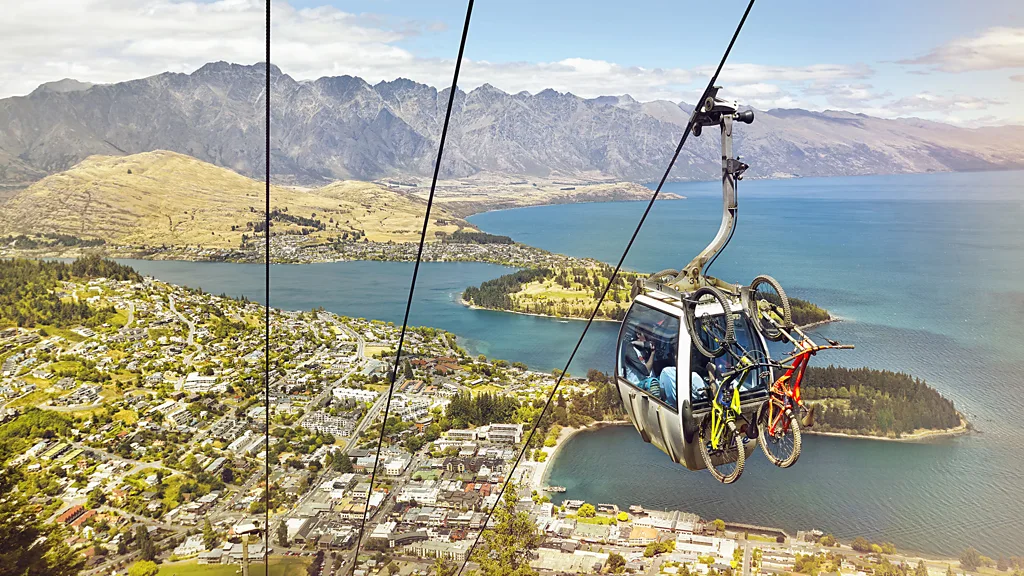
By 2030 – if things go to plan – you'll land in Queenstown on New Zealand's South Island (possibly aboard an electric-powered airplane) and make your way to town. This could be via an electric gondola or hydro-powered ferry. Skiers and snowboarders, who descend on this region in ever-increasing numbers from around the world – will ride electric-powered chairlifts to the surrounding ski resorts. This sustainable tourism vision aims to support a carbon zero future for Queenstown.
Year-round, travellers may take high-speed rides on Lake Wakatipu and along the rapids of the Shotover River aboard the world's first fully electric jet boats. Even the TSS Earnslaw – the hemisphere's oldest coal-fired steamship that has ran excursions since the 1970s – will run on hydrogen.
The region has launched an ambitious plan to become the first tourist town on Earth with a carbon-zero visitor economy by 2030. For decades, Queenstown has led the way in innovation, creating death-defying activities found nowhere else—earning it the title of “adventure capital of the world.” However, most of these activities still rely on fossil fuels. Now, the town is shifting focus and aiming to become the world’s leading ecotourism destination.
Aiming for a carbon-neutral visitor economy would be easier, as it allows for carbon offsets like tree planting. But Queenstown has set its sights higher. Achieving carbon-zero means the town must eliminate all carbon emissions entirely—making it a much more difficult but impactful goal.
"Well, 2030 creates urgency, doesn't it?" Destination Queenstown CEO Mat Woods asks rhetorically. "2030 seemed so hard to achieve that it got the community excited. It means that everyone in the community has to be part of this [push to carbon-zero]."
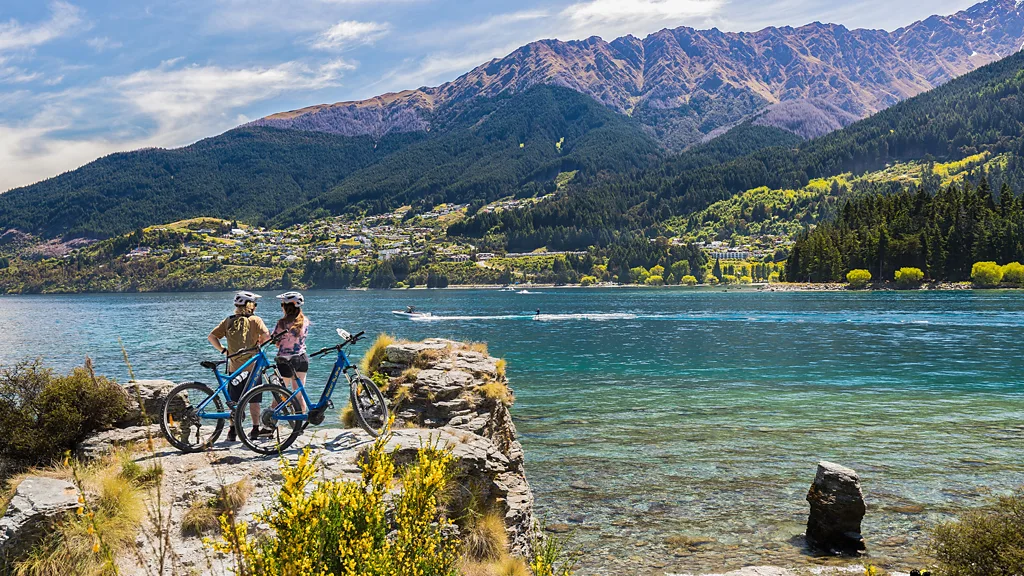
Queenstown’s environmental challenge began with growing concerns that the region’s infrastructure couldn’t keep up with the increasing number of tourists. Set around a lake and surrounded by the rugged Southern Alps, Queenstown has attracted visitors for decades. Ski resorts began operating in the 1940s, and by the 1960s, the town had developed a thriving adventure tourism industry built around its dramatic landscape. These developments helped establish Queenstown as one of New Zealand’s most popular destinations.
Last year, almost 400,000 international visitors came here. An almost 20% rise since 2019, just before the pandemic. This number is particularly significant when you consider Queenstown has a population of around 50,000.
"Locals were asking, what's in this for us," Woods says. "And can we really sustain this region the way it's going?"
Three local tourism organisations—Destination Queenstown, Queenstown Lakes District Council, and Lake Wānaka Tourism—proposed the bold carbon-zero goal in 2021. To their surprise, tourism operators embraced the idea."We took the plan out to the community and weren't sure what to expect," Woods says. "Everyone supported it. And that's the most important part in all of this. Every person has to play a part."
New Zealand eagerly awaits the big shifts towards environmental sustainability in tourism – like the trial of the region's first e-plane flight, set for 2026. Meanwhile, others are already getting stuck in. Mr Chippy, aka Michael Sly, has been quietly composting 20 tonnes of hotel food waste each month around Queenstown. His company, Waste To Wilderness, turns scraps left by tourists into nutrient-dense soil used for food growing. What a perfect example of regenerative tourism! "You don't have to take giant leaps," he says. "Take little steps in the right direction and you'll be amazed by what you can achieve."
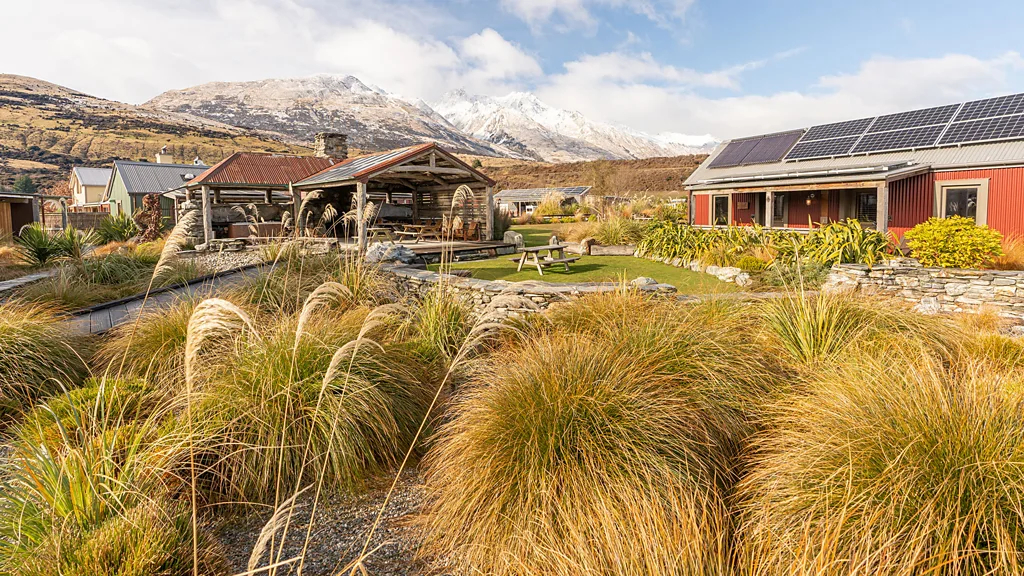
Given the number of tourists coming to Queenstown each year, local accommodation providers must become the big players in Queenstown's plan to run on alternative energy. The promising news is what Headwaters Eco Lodge has achieved – and long before the 2030 goalpost. They are the first accommodation on the planet to be recognised by the Living Building Challenge. The LBC are the most rigorous of all environmental assessment programmes.
Surrounded by the Southern Alps and braided river valleys in the hamlet of Glenorchy, 45 minutes' drive from Queenstown, the lodge is built entirely from recycled building material. It uses the world's most advanced compost toilets, while every litre of wastewater irrigates wetlands built through the middle of the property. Its power comes from one of the South Island's largest solar gardens – there's nearly 600 solar panels on site. These produce so much energy that the excess is used to power another business up the road.
"My husband Paul and I came up this idea of creating these slow tourism experiences that could support this idea of regenerative design," says Headwaters Eco Lodge co-owner, Debbi Brainerd. "We're in the most beautiful place here in Glenorchy. We liked the idea of creating accommodation that had a positive carbon affect, so we created these things in design to help us get there."
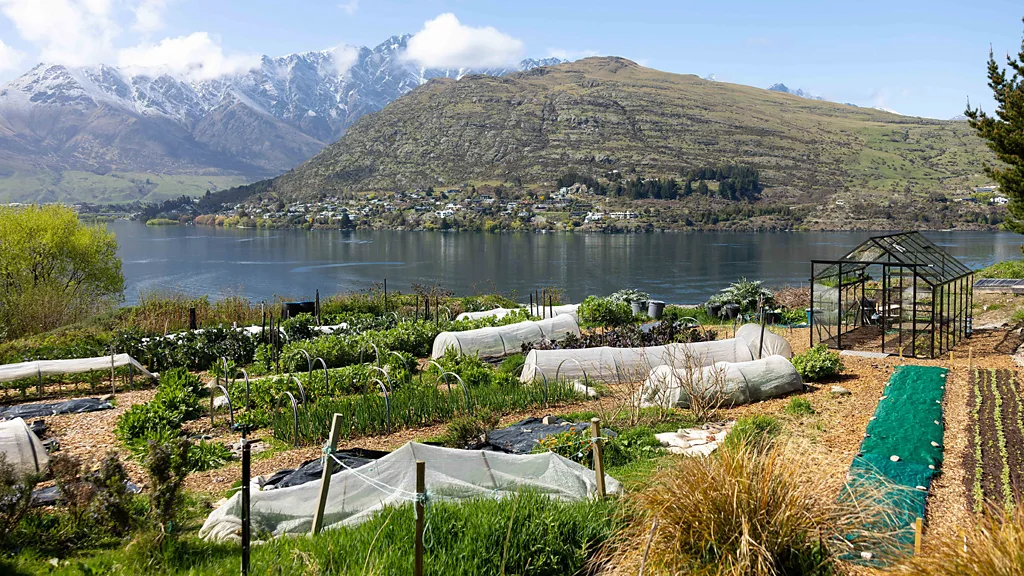
Queenstown's refurbished inn, Sherwood Queenstown, made Expedia's 2019 Top 10 eco-friendly stays list. It runs almost entirely off 248 solar panels. A full-time horticulturist grows nearly half of all produce required by the hotel's restaurant within the property too. "We say that it's all about small things done consistently that really make a difference," explains general manager Hayley Scott. "But it's also important to have big goals to work towards. Everyone in this community is committed to achieving carbon-zero by 2030. It's got us all thinking."
A closer look reveals that world-first environmental innovations are emerging across the Queenstown region. Shotover Jet—famous for speeding travellers through the narrow canyons of the Shotover River at 85 km/h—is trialling the world’s first electric-powered jet boat. After three years of development, the prototype can perform the same daring spins and turns as its fuel-powered counterparts—and it's set to be even more powerful. Once complete, Shotover Jet plans to share the prototype with the wider industry to help eliminate carbon emissions from all jet boats in Queenstown.
The world’s first electric hydro-foiling ferry will soon start operating on Lake Manapōuri, just southwest of Queenstown. The ferry is expected to save more than 240 tonnes of carbon emissions each year. This is equivalent to removing 52 petrol cars from the road. Designed in Sweden, the ferry will run solely on battery power beginning in early 2025. Local Frankton Marina recently upgraded their facilities to support electric boat charging, preparing for the same type of ferry to operate on Lake Wakatipu next.
The innovations towards a carbon zero visitor economy keep on coming. Local wine tour company – Appellation Wine Tours – has introduced two new electric vehicles to their fleet. Another tour company, Nomad Safaris, has started Tesla Tours. They are using zero-emission electric vehicles on private tours to the most scenic parts of the region.
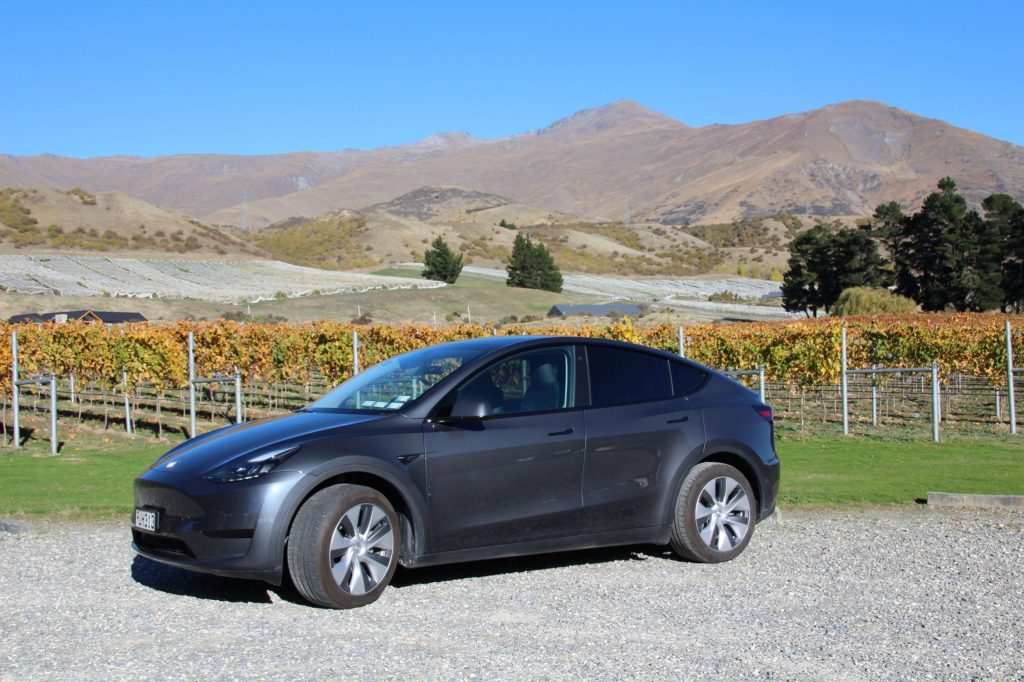
The region has also developed 130km of bike trails. Following the edge of Lake Wakatipu, deep into the backcountry beyond town & along suspension bridges crossing the emerald-coloured Kawarau River. These trails are making Queenstown globally recognised as a cycling destination. By 2026, biking is expected to grow to half the size of the region’s ski economy, which currently dominates tourism...but has a much larger carbon footprint.
Every one of these developments spur other businesses to push for their own environmental victories. Motivating each other for the next big change. As global temperatures surge and storms wreak destruction of unprecedented proportions, it's inspiring to see an entire community of tourism operators embark on an aim to cut 20 years off the carbon-zero target (set by the United Nations Climate Change Council). Efforts may go largely unnoticed in mainstream media, but this community of former fuel-guzzlers plan shows the world there's still hope yet.
Written by Queenstown, NZ
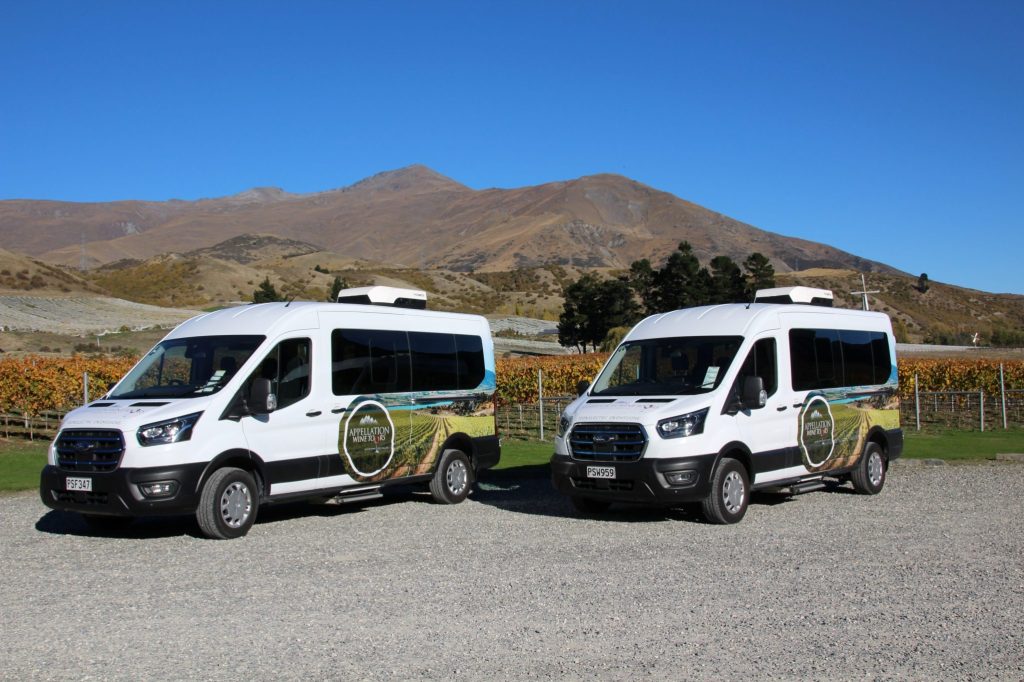
With connections to the transport industry since the 1920s, Appellation Wine Tours has a long history of showcasing fine wines, local sights, and heritage attractions. They are committed to sustainability. Importantly, they have embraced electric vehicles, which are emission-free, for their tours. This proves that electric vehicles are emission free in the most practical sense.
After they switched to 80% electric in 2022 for the Nelson's public bus fleet, the owners were inspired. They began to wonder how electrification could benefit its other businesses, including Appellation Wine Tours.
On the road now for over 24 years, Appellation covers more than 5,000 kilometres in an average week during peak season. This is due to daily small-group and private tours. Now, the business proudly leads by example with its emissions-free kilometres growing by the day. This is thanks to their electric vehicles. They purchased two new electric Ford E-Transit 12 seater vans in December 2023. The team at Appellation quickly noticed the rewards with operational efficiencies. They also benefited from economies of scale. Moreover, they observed the obvious environmental benefits.
“For more than two decades our tours have been an effective way of reducing emissions around the district - this is compared with individual car travel. So we wanted to take it a step further by investing in zero emissions vehicles,” - Sarah Russell, General Manager at Appellation Wine Tours. Indeed, electric vehicles are now leading the way toward emission-free travel.
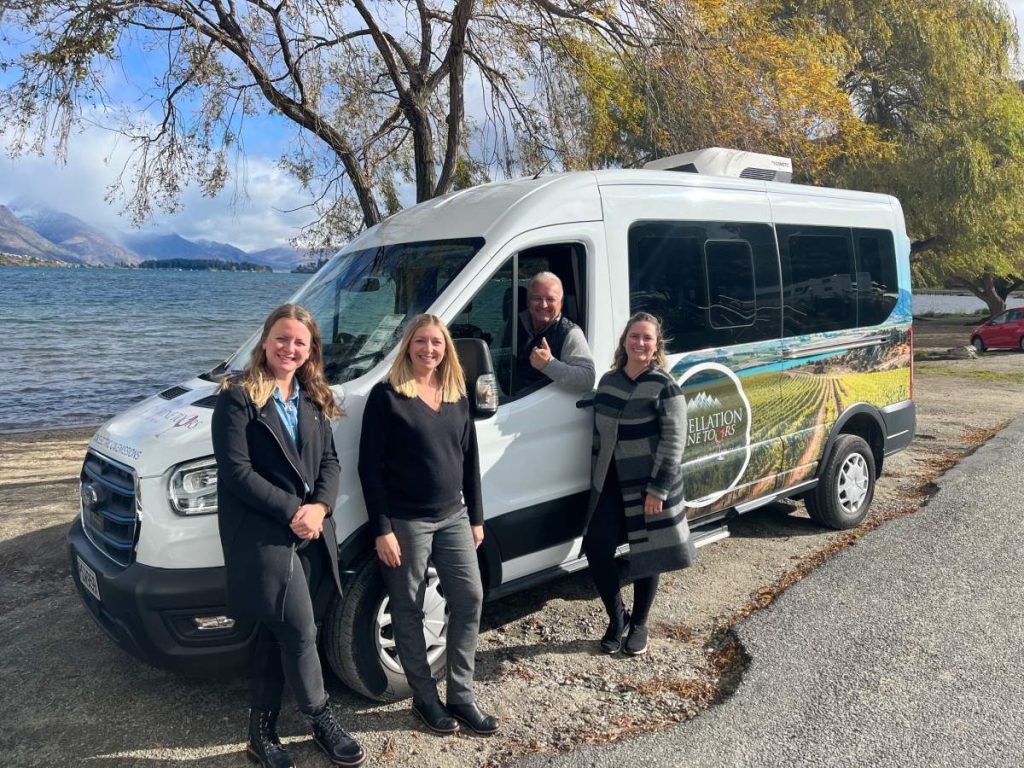
Supporting Queenstown Lakes' goal of achieving a carbon zero visitor economy by 2030, environmental sustainability was an important factor. This was strongly considered when Appellation looked into electric vehicles.
Although their electric vehicles require a higher upfront investment—especially since these are custom-made—their operating costs are significantly lower than those of fuel-based alternatives.
“Electricity generally costs less than diesel or petrol, and we spend less on maintenance because EVs have fewer moving parts and experience less wear and tear,” says Stu Cordelle, Business and Sales Manager at Appellation Wine Tours.
Electric vehicles typically use fewer parts and need fewer replacements. They require servicing less frequently. Additionally, large electric vehicles in New Zealand benefit from a government incentive. They are exempt from road user charges until December 2025, creating further savings for the business. “Vehicle driving range was another important consideration. In a typical day including pick-ups and drop offs around Queenstown, a tour can cover anywhere between 150 – 200 kilometres” Sarah adds.
An EV can drive an estimated 250 km per trip. This allows Appellation Wine Tours to explore the district comfortably without needing to stop and charge. This setup delivers a great experience for their guests. The company installed EV charging stations at their headquarters in Frankton, so vehicles start each day fully charged and ready to go. This approach saves time for drivers and boosts efficiency across the business. It eliminates the need to top up fuel at the end of each day.
Sarah explains, “It’s peace of mind for our drivers. They know they can come back to the yard and charge it ready for the morning.”
Many wineries and cellar doors have also installed their own electric charging stations.
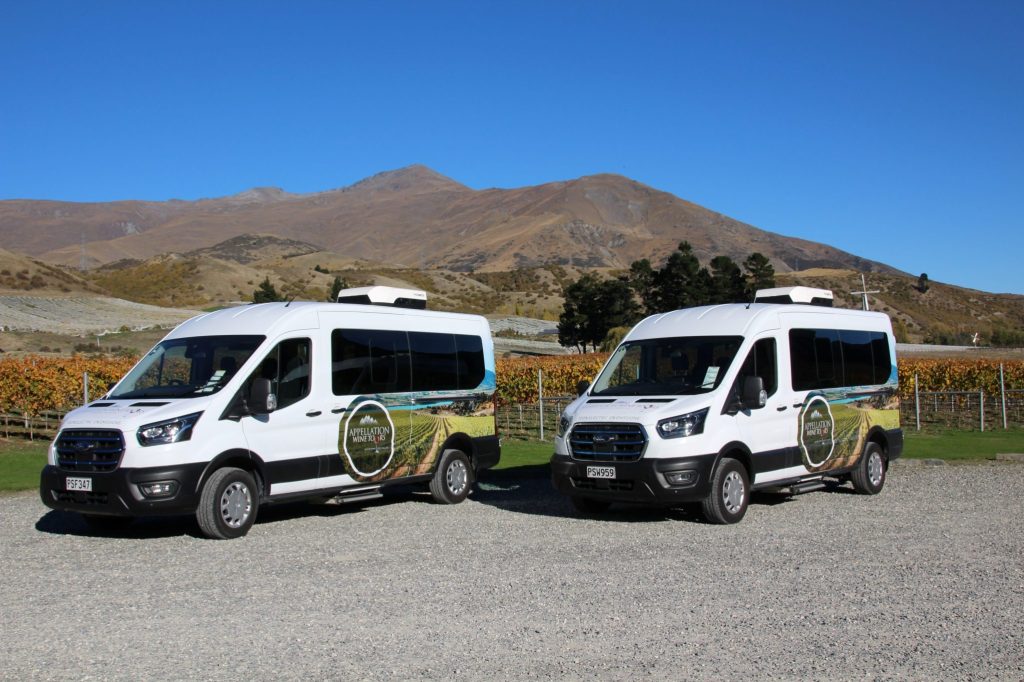
Looking ahead, the team is learning each day about the way speed and weather can impact driving range. They are adapting as they go. They’re also looking at continuing to invest more in sustainable business practices and assets, and starting to measure carbon use.
Larger electric passenger vehicles in New Zealand are not readily available and hard to source. So Appellation’s advice to anyone thinking about electrifying a fleet is to plan it early. Investing in the two Ford E-Transits is just the beginning for Appellation. It is a step in the right direction for business, guest experience and the wider region.
If you'd like to see more ways in which Queenstown as a whole is aiming towards its goal to ''Electrify Queenstown''...take a look here. With a goal of being carbon zero by 2030, there's a lot of changes pending. This includes the transition to electric vans.
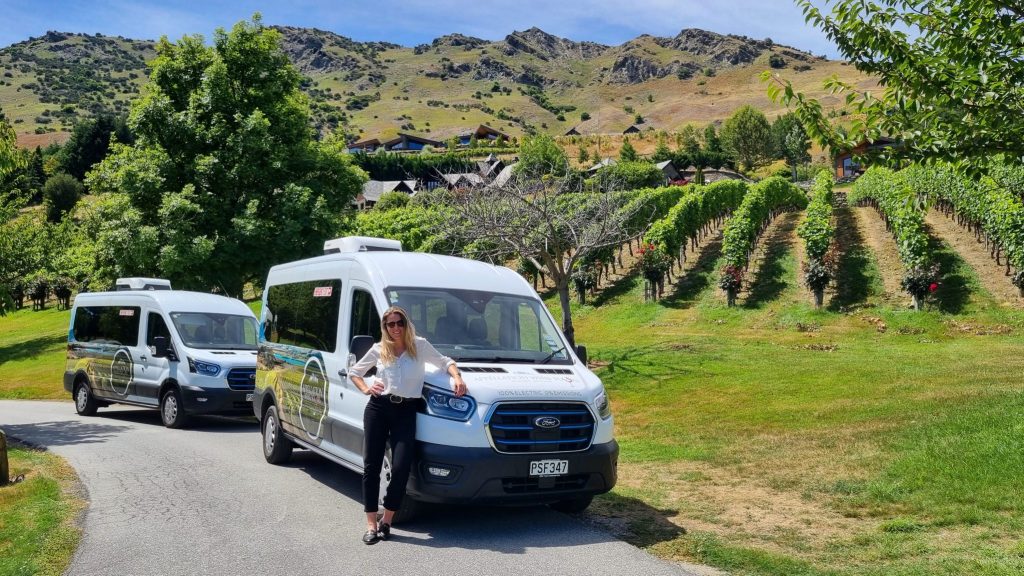
Proudly introducing sustainable transportation with electric vans (EVs) into their fleet. Appellation Wine Tours have been the leading provider of immersive wine experiences in the Central Otago region for over 24 years. This significant investment underscores the company's commitment to long-term sustainability. It sets a new standard for eco-conscious tourism in the area.
The introduction of these state-of-the-art EVs aligns seamlessly with the company's mission. With this intention, Appellation aim to provide unforgettable wine tours while prioritising sustainability. They are reducing their carbon footprint and promoting environmentally conscious tourism, thanks to their new fleet of electric vans.
First in the Region to Offer Wine Tours in an EV: Appellation Wine Tours takes pride in being the first in the Central Otago region to pioneer wine tours in an EV. They are leading the way in sustainable travel experiences.
This ground-breaking move with electric vans reinforces the company's dedication. With this in mind and a big focus on showcasing the finest vineyards and scenery while prioritising eco-friendly practices, Appellation are enhancing the overall experience for their valued customers.
Sarah Russell, General Manager of Appellation Wine Tours expressed enthusiasm about this eco-conscious initiative, stating -
"At Appellation Wine Tours, we are always thinking about our environmental impact and going electric made sense. We want to continue to provide exceptional experiences whilst also contributing toward a more sustainable future.”
“The introduction of the Ford Transit EVs represents a significant step towards decarbonisation and a sustainable future for tourism in the Central Otago region."
The new Ford Transit Electric Vans are now in operation. Appellation Wine Tours invites wine enthusiasts and eco-conscious travellers to come. They can embark on unforgettable journeys throughout the breath-taking landscapes of Central Otago.
If you'd like to see more ways in which Queenstown as a whole is aiming towards its goal to ''Electrify Queenstown''...take a look here. With a goal of being carbon zero by 2030, there's a lot of changes pending. This includes the transition to electric vans.
